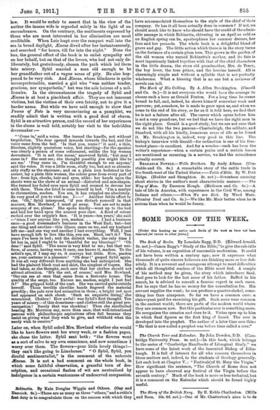Robnetta. By Kate Douglas Wiggin and Others. (('ay and Hancock.
6s.)—There are as many as three "others," and &critic's first duty is to congratulate them on the success with which they have accommodated themselves to the style of the chief of their company. Or has it all been actually done in common ? If not, we should much like to know who should have the credit of the admir- able passage in which Robinetta, shivering in an April as cold as an English spring can be, apostrophises her summer dresses:, her fans and her parasols. The whole book is a delightful blend of grave and gay. The little action which there is in the story turns on the fortunes of a certain plum tree. This grows in the garden of the old woman who nursed Robinetta's mother, and its fate is most ingeniously linked together with that of the chief characters in the little drama, the stern old grandmother, Mrs. de Tracy, the boy lover, the true prince, and the heroine herself. All is charmingly simple and without a syllable that is not perfectly wholesome. What a blessing that is no one but a reviewer of novels can tell.






































 Previous page
Previous page